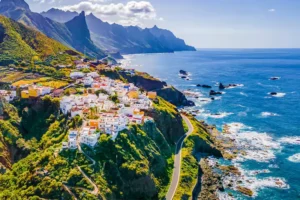In the Canary Islands, locals are speaking out against the rapid increase in tourism, advocating for a model that benefits both the economy and the community.
Despite tourism’s significant role in the islands’ economy, many argue it has also led to social and environmental issues.
As the situation escalates, activists disrupt major tourism events, pushing for a sustainable approach that honors both the environment and community well-being.

They highlight pressing issues like wildlife disturbances, the loss of indigenous heritage, and escalating poverty rates among locals. However, tourism also brings undeniable benefits to the islands.
It fosters cultural exchange, aids in the preservation of natural and cultural assets, and significantly boosts the Canarian identity on a global scale.
This sector is a vital source of employment and has been pivotal in developing local infrastructure.
To combat the negative impacts, officials suggest capping growth to ensure sustainable development.
Lanzarote serves as a prime example, where stringent restrictions on tourist facilities have been implemented to safeguard the island’s unique character.
Overall, the Canary Islands gain economically from tourism, but there is a strong local demand for a new strategy.
Residents urge a balanced approach where economic gains do not compromise social justice or ecological integrity.

